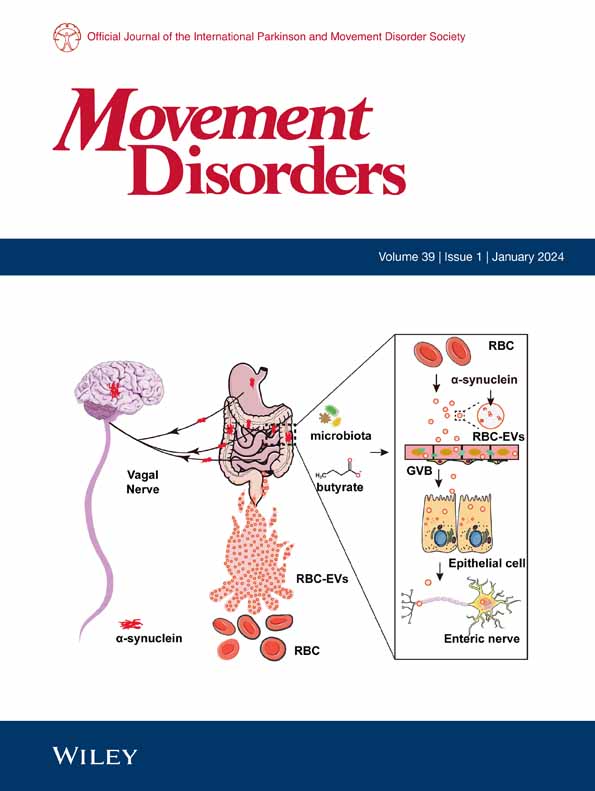Nina-Maria Wilpert MD, PhD, Angela L. Hewitt MD, PhD, Roser Pons MD, PhD, Marie-Thérèse Henke MSc, Andrea Dell'Orco MSc, Martin Bauer MSc, Christiane Grolik MD, Stephan Menz, Monika Wahle, Annika Zink PhD, Alessandro Prigione MD, PhD, Christina Reinauer MD, Catharina Lange, Christian Furth MD, Knut Brockmann MD, Sabine Jung-Klawitter MD, Stine Christ MD, Angela M. Kaindl MD, Anna Tietze MD, PhD, Heiko Krude MD, Thomas Opladen MD, Markus Schuelke MD
下载PDF
{"title":"Allan - Herndon - Dudley综合征(MCT8缺乏症)患者在儿童期表现出帕金森症状,并对左旋多巴/卡比多巴治疗有反应","authors":"Nina-Maria Wilpert MD, PhD, Angela L. Hewitt MD, PhD, Roser Pons MD, PhD, Marie-Thérèse Henke MSc, Andrea Dell'Orco MSc, Martin Bauer MSc, Christiane Grolik MD, Stephan Menz, Monika Wahle, Annika Zink PhD, Alessandro Prigione MD, PhD, Christina Reinauer MD, Catharina Lange, Christian Furth MD, Knut Brockmann MD, Sabine Jung-Klawitter MD, Stine Christ MD, Angela M. Kaindl MD, Anna Tietze MD, PhD, Heiko Krude MD, Thomas Opladen MD, Markus Schuelke MD","doi":"10.1002/mds.30152","DOIUrl":null,"url":null,"abstract":"<div>\n \n \n <section>\n \n <h3> Background</h3>\n \n <p>Patients with mutations in the monocarboxylate transporter 8 (MCT8, <i>SLC16A2</i>) suffer from X-linked recessive Allan-Herndon-Dudley syndrome (AHDS), which is characterized by developmental delay and a severe movement disorder. Current trials using thyroid hormone derivatives to overcome the transporter defect have failed to achieve patient-oriented therapeutic goals.</p>\n </section>\n \n <section>\n \n <h3> Objectives</h3>\n \n <p>Our aim was to define the type of movement disorder in AHDS in an observational cohort study and to investigate the causative role of the dopaminergic system.</p>\n </section>\n \n <section>\n \n <h3> Methods</h3>\n \n <p>We present longitudinal clinical data from the DEEPTYPE registry of 11 patients with video documentation, standardized phenotyping, cerebrospinal fluid (CSF) analysis, neuroimaging data, and the treatment response to levodopa/carbidopa supplementation.</p>\n </section>\n \n <section>\n \n <h3> Results</h3>\n \n <p>Children presented with signs of childhood parkinsonism, including hypokinesia, hypomimia, inability to sit or stand, rigidity, dystonia, and autonomic dysfunction. CSF homovanillic acid concentrations were decreased (n = 12), suggesting an isolated dopamine pathway impairment. Seven out of 8 patients responded favorably to <span>l</span>-dopa/carbidopa supplementation and we did not observe any adverse drug reactions.</p>\n </section>\n \n <section>\n \n <h3> Conclusions</h3>\n \n <p>AHDS is associated with childhood parkinsonism, which is linked with biochemical abnormalities of dopamine metabolism. It can be treated with <span>l</span>-dopa/carbidopa supplementation. However, further research is needed to elucidate the exact effect of MCT8 deficiency on dopamine metabolism. © 2025 The Author(s). <i>Movement Disorders</i> published by Wiley Periodicals LLC on behalf of International Parkinson and Movement Disorder Society.</p>\n </section>\n </div>","PeriodicalId":213,"journal":{"name":"Movement Disorders","volume":"40 5","pages":"938-949"},"PeriodicalIF":7.4000,"publicationDate":"2025-03-15","publicationTypes":"Journal Article","fieldsOfStudy":null,"isOpenAccess":false,"openAccessPdf":"https://onlinelibrary.wiley.com/doi/epdf/10.1002/mds.30152","citationCount":"0","resultStr":"{\"title\":\"Patients with Allan-Herndon-Dudley Syndrome (MCT8 Deficiency) Display Symptoms of Parkinsonism in Childhood and Respond to Levodopa/Carbidopa Treatment\",\"authors\":\"Nina-Maria Wilpert MD, PhD, Angela L. Hewitt MD, PhD, Roser Pons MD, PhD, Marie-Thérèse Henke MSc, Andrea Dell'Orco MSc, Martin Bauer MSc, Christiane Grolik MD, Stephan Menz, Monika Wahle, Annika Zink PhD, Alessandro Prigione MD, PhD, Christina Reinauer MD, Catharina Lange, Christian Furth MD, Knut Brockmann MD, Sabine Jung-Klawitter MD, Stine Christ MD, Angela M. Kaindl MD, Anna Tietze MD, PhD, Heiko Krude MD, Thomas Opladen MD, Markus Schuelke MD\",\"doi\":\"10.1002/mds.30152\",\"DOIUrl\":null,\"url\":null,\"abstract\":\"<div>\\n \\n \\n <section>\\n \\n <h3> Background</h3>\\n \\n <p>Patients with mutations in the monocarboxylate transporter 8 (MCT8, <i>SLC16A2</i>) suffer from X-linked recessive Allan-Herndon-Dudley syndrome (AHDS), which is characterized by developmental delay and a severe movement disorder. Current trials using thyroid hormone derivatives to overcome the transporter defect have failed to achieve patient-oriented therapeutic goals.</p>\\n </section>\\n \\n <section>\\n \\n <h3> Objectives</h3>\\n \\n <p>Our aim was to define the type of movement disorder in AHDS in an observational cohort study and to investigate the causative role of the dopaminergic system.</p>\\n </section>\\n \\n <section>\\n \\n <h3> Methods</h3>\\n \\n <p>We present longitudinal clinical data from the DEEPTYPE registry of 11 patients with video documentation, standardized phenotyping, cerebrospinal fluid (CSF) analysis, neuroimaging data, and the treatment response to levodopa/carbidopa supplementation.</p>\\n </section>\\n \\n <section>\\n \\n <h3> Results</h3>\\n \\n <p>Children presented with signs of childhood parkinsonism, including hypokinesia, hypomimia, inability to sit or stand, rigidity, dystonia, and autonomic dysfunction. CSF homovanillic acid concentrations were decreased (n = 12), suggesting an isolated dopamine pathway impairment. Seven out of 8 patients responded favorably to <span>l</span>-dopa/carbidopa supplementation and we did not observe any adverse drug reactions.</p>\\n </section>\\n \\n <section>\\n \\n <h3> Conclusions</h3>\\n \\n <p>AHDS is associated with childhood parkinsonism, which is linked with biochemical abnormalities of dopamine metabolism. It can be treated with <span>l</span>-dopa/carbidopa supplementation. However, further research is needed to elucidate the exact effect of MCT8 deficiency on dopamine metabolism. © 2025 The Author(s). <i>Movement Disorders</i> published by Wiley Periodicals LLC on behalf of International Parkinson and Movement Disorder Society.</p>\\n </section>\\n </div>\",\"PeriodicalId\":213,\"journal\":{\"name\":\"Movement Disorders\",\"volume\":\"40 5\",\"pages\":\"938-949\"},\"PeriodicalIF\":7.4000,\"publicationDate\":\"2025-03-15\",\"publicationTypes\":\"Journal Article\",\"fieldsOfStudy\":null,\"isOpenAccess\":false,\"openAccessPdf\":\"https://onlinelibrary.wiley.com/doi/epdf/10.1002/mds.30152\",\"citationCount\":\"0\",\"resultStr\":null,\"platform\":\"Semanticscholar\",\"paperid\":null,\"PeriodicalName\":\"Movement Disorders\",\"FirstCategoryId\":\"3\",\"ListUrlMain\":\"https://onlinelibrary.wiley.com/doi/10.1002/mds.30152\",\"RegionNum\":1,\"RegionCategory\":\"医学\",\"ArticlePicture\":[],\"TitleCN\":null,\"AbstractTextCN\":null,\"PMCID\":null,\"EPubDate\":\"\",\"PubModel\":\"\",\"JCR\":\"Q1\",\"JCRName\":\"CLINICAL NEUROLOGY\",\"Score\":null,\"Total\":0}","platform":"Semanticscholar","paperid":null,"PeriodicalName":"Movement Disorders","FirstCategoryId":"3","ListUrlMain":"https://onlinelibrary.wiley.com/doi/10.1002/mds.30152","RegionNum":1,"RegionCategory":"医学","ArticlePicture":[],"TitleCN":null,"AbstractTextCN":null,"PMCID":null,"EPubDate":"","PubModel":"","JCR":"Q1","JCRName":"CLINICAL NEUROLOGY","Score":null,"Total":0}
引用次数: 0
引用
批量引用

 求助内容:
求助内容: 应助结果提醒方式:
应助结果提醒方式:


